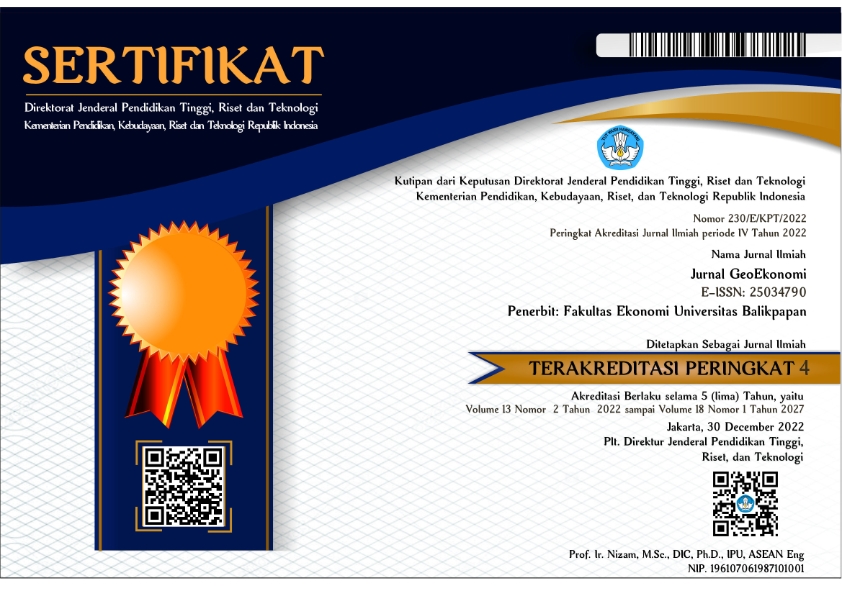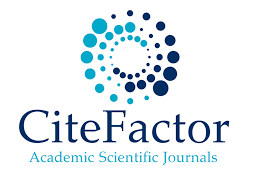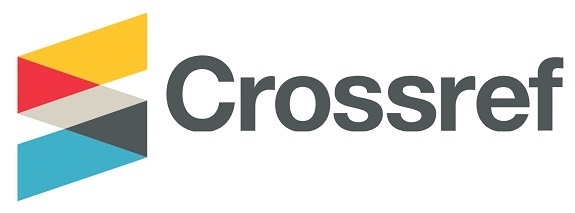The Influence of Human Capital on Financial Performance and Corporate Value
DOI:
https://doi.org/10.36277/geoekonomi.v10i1.45Keywords:
Human Capital, Profitability, Financial PerformanceAbstract
Human Capital (HC) reflects the knowledge capital of employees of an organization. In this era there was a huge changes in the economic field where human capital would be a factor of production that has a vital role. One way to increase human capital for companies is to increase expertise through learning experience programs. Profitability is a reflection of the financial performance of a company and a company that is well aware of the management of Human Capital, because the good and bad of Human Capital will affect the company's financial position directly and affect the company's profitability in the end.
This study aims to determine whether the influence of human capital on firm value with financial performance as an intervening variable in the banking companies on the IDX registered in 2012-2016. This study uses two approaches, namely descriptive approach and explanatory approach. The technique of determining the sample of this study was purposive sampling carried out on banking companies which during 2012 to 2016 were listed on the Indonesia Stock Exchange.
Downloads
References
Afandi, C. D. F., & Riharjo, I. B. (2017). Pengaruh Intellectual Capital Terhadap Kinerja Perusahaan Yang Terdaftar Di Bursa Efek Indonesia. Jurnal Ilmu Dan Riset Akuntansi, 6(7). Retrieved From Https://Ejournal.Stiesia.Ac.Id/Jira/Article/View/3287/2803
Agustin, T., & Hermanto, S. B. (2016). Pengaruh Nilai Perusahaan, Profitabilitas Dan Risiko Keuangan Terhadap Earnings Management. Jurnal Ilmu Dan Riset Akuntansi, 4(1).
Akpinar, A. T., & Akdemir, A. (1999). Intellectual Capital. In Third European Conference (Pp. 332–340).
Andriani, C. (2017). Penerapan Knowledge Management Pada Universitas Negeri Padang. Economac: Jurnal Ilmiah Ilmu Ekonomi, 1(1), 33–39.
Andriessen, D. (2004). Making Sense Of Intellectual Capital. Routledge., 295(2), 295–336. Https://Doi.Org/10.1016/J.Aap.2008.12.010
Coff, Russel. (1997). Human Assets and management dilemmas: Coping with Hazards on the Road to Resources-Based Theory. The Academy of Management Review.
Eny Sulistyaningrum. (2018). Potret Kondisi Human Capital Di Indonesia?: Permasalahan Dan Tantangan | Macroeconomic Dashboard. Retrieved July 1, 2018, From Https://Macroeconomicdashboard.Feb.Ugm.Ac.Id/Potret-Kondisi-Human-Capital-Di-Indonesia-Permasalahan-Dan-Tantangan/
Fitriyani, V. K. (2016). Pengaruh Intellectual Capital Terhadap Nilai Perusahaan Yang Diukur Menggunakan Tobins Q Pada Saham-Saham Lq-45 Periode 2011-2015. Universitas Widyatama.
Gunawan, K. H., & Sukartha, I. M. (2013). Kinerja Pasar Dan Kinerja Keuangan Sesudah Merger Dan Akuisisi Di Bursa Efek Indonesia. E-Jurnal Akuntansi, 271–290.
Hanafi, M. M. (2015). Abdul Halim. 2005. Analisis Laporan Keuangan.
Husnan, S. (2004). Dasar-Dasarmanajemenkeuangan”. Upp Amp Ykpm.
Kepramareni, P., Novitasari, N. L. G., & Pitaloka, B. (2016). Pengaruh Kinerja Keuangan Terhadap Profitabilitas Pada Pt. Bpr Saraswati Ekabumi (Periode Tahun 2013–2015). Prosiding, 247–265.
Kuryanto, B., & Syafruddin, M. (2008). Pengaruh Modal Intelektual Terhadap Kinerja Perusahaan.
Lahagu, S. H. (2013). Pengaruh Intellectual Capital Terhadap Kinerja Keuangan Sektor Perbankan. Akuntansi Krida Wacana, 13(1).
Lavie, D. (2007). Alliance Portfolios And Firm Performance: A Study Of Value Creation And Appropriation In The Us Software Industry. Strategic Management Journal, 28(12), 1187–1212.
Lukiana, N. (2013). Implementasi Rasio Keuangan Untuk Menilai Kinerja Keuangan. Wiga: Jurnal Penelitian Ilmu Ekonomi, 3(2), 54–69.
Mursidah, M., & Ummah, A. (2016). Analisis Pengaruh Return On Asset, Return On Equity, Net Profit Margin, Debt To Equity Ratio, Dan Current Ratio, Terhadap Pertumbuhan Laba Pada Perusahaan Otomotif Di Bursa Efek Indonesia. Economic Management & Business, 15(4).
Parmar, B. L., Freeman, R. E., Harrison, J. S., Wicks, A. C., Purnell, L., & De Colle, S. (2010). Stakeholder Theory: The State Of The Art. The Academy Of Management Annals, 4(1), 403–445.
Prihadi, T. (2010). Analisis Laporan Keuangan Teori Dan Aplikasi. Jakarta: Ppm.
Randa, F., & Solon, S. A. (2012). Pengaruh Modal Intelektual Terhadap Nilai Perusahan. Jurnal Sistem Informasi Manajemen Dan Akuntansi, 10(1), 24–27.
Sartono, A. (2001). Manajemen Keuangan Teori Dan Aplikasi. Yogyakarta: Bpfe.
Sawarjuwono, T., & Kadir, A. P. (2004). Intellectual Capital: Perlakuan, Pengukuran Dan Pelaporan (Sebuah Library Research). Jurnal Akuntansi Dan Keuangan, 5(1), 35–57.
Sumantri, F., & Susanti, S. (2016). Analisis Perbandingan Kinerja Keuangan Perbankan Bumn Periode 2010–2015. Moneter-Jurnal Akuntansi Dan Keuangan, 3(1).
Sunarsih, N. M., & Mendra, N. P. Y. (2012). Pengaruh Modal Intelektual Terhadap Nilai Perusahaan Dengan Kinerja Keuangan Sebagai Variabel Intervening Pada Perusahaan Yang Terdaftar Di Bursa Efek Indonesia. Simposium Nasional Akuntansi Xv, 1(2).
Ulum, I. (2009). Intellectual Capital Performance Sektor Perbankan Di Indonesia. Jurnal Akuntansi Dan Keuangan, 10(2), 77–84.
Www.Kemenkeu.Go.Id. (2018). Menkeu: Semua Setuju Human Capital Penting, Tapi How?
Zeghal, D., & Maaloul, A. (2010). Analysing Value Added As An Indicator Of Intellectual Capital And Its Consequences On Company Performance. Journal Of Intellectual Capital, 11(1), 39–60.
Downloads
Published
How to Cite
Issue
Section
License
You are free to:
Share - copy and redistribute the materials in any medium or format for any purpose, even for commercial purposes.
Adapt - compose, change and develop the material for any purpose, even for commercial purposes.
The licensor cannot revoke these freedoms as long as you follow the license terms.
With the following conditions:
Attribution - you must give appropriate credit, provide a link to the license, and indicate if changes have been made. You may do so in a reasonable manner, but not in any way that suggests that the licensor endorses you or your use.
No additional restrictions - You may not implement legal provisions or technological measures that legally restrict others from doing anything permitted by the license.
Notice:
You do not have to comply with the license for elements of the material that are in the public domain or where your use is permitted by an applicable exclusion or restriction.
No warranties are given. This license may not grant all the permissions necessary for your intended use. For example, other rights such as publicity, privacy, or moral rights may limit how you use the material.







_geoekonomi.png)
_geoekonomi.png)
















